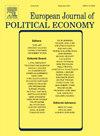Random walks into democracy and back: The case against causal explanations of democratization
IF 2.4
3区 经济学
Q2 ECONOMICS
引用次数: 0
Abstract
Due to the complexity of historical processes that have led into sustainable democracy, determining generally applicable theories of democratization without violating standards of modern methodology is difficult if not impossible. Hence, we follow an alternative avenue by distinguishing singular democratization events from the politico-institutional soil on which they fall. We represent the latter by the type of loyalty on which government officials coordinate in cases of loyalty conflicts: either to other government officials; or to the rules of the underlying power-sharing arrangement. We embed our results in a dynamic framework and then run a number of simulations that reconstruct possible historical paths into and out of (sustainable) democracy. We demonstrate that the evolution of sustainable democracy, but also its demise, may evolve out of a purely random walk, i.e. a sequence of serially — although not necessarily spatially — uncorrelated historical events, rather than out of any identifiable and generalizable causal driver.
随机走向民主,又回到民主:反对民主化的因果解释的案例
由于导致可持续民主的历史进程的复杂性,在不违反现代方法论标准的情况下确定普遍适用的民主化理论是困难的,如果不是不可能的话。因此,我们遵循另一种途径,将单一的民主化事件与它们所处的政治制度土壤区分开来。我们通过政府官员在忠诚冲突情况下协调的忠诚类型来表示后者:要么是对其他政府官员;或者根本的权力分享安排的规则。我们将我们的结果嵌入到一个动态框架中,然后运行一些模拟,重建进入和退出(可持续)民主的可能历史路径。我们证明,可持续民主的演变,以及它的消亡,可能是从纯粹的随机行走中演变而来的,即一系列连续的(尽管不一定是空间上的)不相关的历史事件,而不是从任何可识别的、可概括的因果驱动因素中演变而来的。
本文章由计算机程序翻译,如有差异,请以英文原文为准。
求助全文
约1分钟内获得全文
求助全文
来源期刊

European Journal of Political Economy
Multiple-
CiteScore
3.40
自引率
10.00%
发文量
106
期刊介绍:
The aim of the European Journal of Political Economy is to disseminate original theoretical and empirical research on economic phenomena within a scope that encompasses collective decision making, political behavior, and the role of institutions. Contributions are invited from the international community of researchers. Manuscripts must be published in English. Starting 2008, the European Journal of Political Economy is indexed in the Social Sciences Citation Index published by Thomson Scientific (formerly ISI).
 求助内容:
求助内容: 应助结果提醒方式:
应助结果提醒方式:


